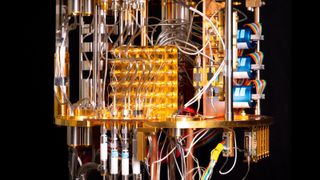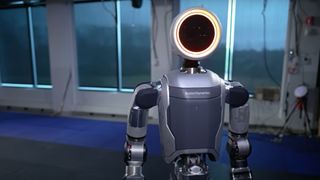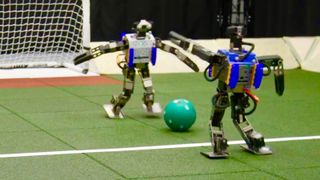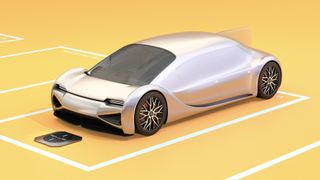
Keumars Afifi-Sabet
Keumars is the technology editor at Live Science. He has written for a variety of publications including ITPro, The Week Digital, ComputerActive, The Independent, The Observer, Metro and TechRadar Pro. He has worked as a technology journalist for more than five years, having previously held the role of features editor with ITPro. He is an NCTJ-qualified journalist and has a degree in biomedical sciences from Queen Mary, University of London. He's also registered as a foundational chartered manager with the Chartered Management Institute (CMI), having qualified as a Level 3 Team leader with distinction in 2023.
Latest articles by Keumars Afifi-Sabet

Radical quantum computing theory could lead to more powerful machines than previously imagined
By Keumars Afifi-Sabet published
Scientists have just theorized how to connect quantum processors over vast distances to form a giant quantum computing network that acts as a single machine.

Unique 'fan-on-a-chip' could prevent AI smartphones from overheating — with 1st devices launching in 2026
By Keumars Afifi-Sabet published
The "xMEMS XMC-2400 µCooling" chip aims to keep future smartphones from overheating as they become more powerful.

World's fastest charger can fully power up your smartphone in under 5 minutes
By Keumars Afifi-Sabet published
New record-breaking fast-charging technology can power up your smartphone battery quicker than you can write an email.

Scientists achieve record-breaking 402 Tbps data transmission speeds — 1.6 million times faster than home broadband
By Keumars Afifi-Sabet published
Scientists break data transmission rate world record for a second time this year — boosting fiber-optic speeds by 25% to a staggering 402 Tbps.

New quantum computer smashes 'quantum supremacy' record by a factor of 100 — and it consumes 30,000 times less power
By Keumars Afifi-Sabet published
The 56-qubit H2-1 computer has broken the previous record in the 'quantum supremacy' benchmark first set by Google in 2019.

'World's purest silicon' could lead to 1st million-qubit quantum computing chips
By Keumars Afifi-Sabet published
Scientists engineer the 'purest ever silicon' to build reliable qubits that can be manufactured to the size of a pinhead on a chip and power million-qubit quantum computers in the future.

'It would be within its natural right to harm us to protect itself': How humans could be mistreating AI right now without even knowing it
By Keumars Afifi-Sabet published
How can we truly know if AI is sentient? We do not yet fully understand the nature of human consciousness, so we cannot discount the possibility that today's AI is indeed sentient — and that we are mistreating it to potentially grave consequences.

Tiny, transparent chip could transform your smartphone into a professional-grade camera
By Keumars Afifi-Sabet published
Scientists built a "smart filter" that can work with a cheap smartphone camera to transform low-resolution photos into supersharp images without glare and other issues.

6G speeds hit 100 Gbps in new test — 500 times faster than average 5G cellphones
By Keumars Afifi-Sabet published
Scientists in Japan have transferred data at 100 gigabits per second in high-frequency wavelength bands over a distance of 330 feet for the first time.

Quantum computing breakthrough could happen with just hundreds, not millions, of qubits using new error-correction system
By Keumars Afifi-Sabet published
Scientists have designed a physical qubit that behaves as an error-correcting "logical qubit," and now they think they can scale it up to make a useful quantum computer using a few hundred.

1st self-driving car that 'lets you take your eyes off the road' goes on sale in the US — and it's not a Tesla
By Keumars Afifi-Sabet published
Mercedes-Benz has sold at least one of its new vehicles fitted with its Drive Pilot autonomous driving software, which lets you take your hands off the steering wheel and your eyes off the road.

Weird magnetic 'skyrmion' quasiparticle could be used as a bit in advanced computing memory
By Keumars Afifi-Sabet published
Scientists want to replace electrons with so-called 'nanobubbles' — or skyrmions — to store data more densely and efficiently in advanced memory components that would replace RAM and flash storage.

Intel unveils largest-ever AI 'neuromorphic computer' that mimics the human brain
By Keumars Afifi-Sabet published
Intel's Hala Point neuromorphic computer is powered by more than 1,000 new AI chips and performs 50 times faster than equivalent conventional computing systems.

Watch Boston Dynamics' newest Atlas robot wake up in the creepiest way possible
By Keumars Afifi-Sabet published
Boston Dynamics replaces its flagship humanoid robot after 10 years with a completely new machine that looks like the Pixar lamp with a mechanical humanoid body.

Tired of your laptop battery degrading? New 'pulse current' charging process could double its lifespan.
By Keumars Afifi-Sabet published
Using pulse current charging, or a constant current divided with a few short breaks, lithium-ion batteries hold up better over hundreds of charging cycles and can last twice as long.

China develops new light-based chiplet that could power artificial general intelligence — where AI is smarter than humans
By Keumars Afifi-Sabet published
The creators of the Taichi chiplet claim it's more energy-efficient and scalable than other photonic components and can be used to train superhuman AI models in the future.

Watch derpy robots show off their soccer skills thanks to new AI training method
By Keumars Afifi-Sabet published
Short, stumpy robots learned how to play soccer — and improved their skills dramatically thanks to a new AI training technique that combines several pre-existing methods.

New York college becomes 1st university with on-campus IBM quantum computer that is 'scientifically useful'
By Keumars Afifi-Sabet published
IBM's latest System One quantum computer is based at the Rensselaer Polytechnic Institute (RPI) and is the 1st IBM quantum machine to be installed at a university campus in the U.S.

Error-corrected qubits 800 times more reliable after breakthrough, paving the way for 'next level' of quantum computing
By Keumars Afifi-Sabet published
Scientists used a technique called 'active syndrome extraction' to build four logical qubits from 30 physical ones and run 14,000 experiments without detecting a single error.

Fiber-optic data transfer speeds hit a rapid 301 Tbps — 1.2 million times faster than your home broadband connection
By Keumars Afifi-Sabet published
The researchers hit a rate of 301 terabits per second — equivalent to transferring 1,800 4K movies over the internet in one second — using existing fiber-optic cables.

Future quantum computers will be no match for 'space encryption' that uses light to beam data around — with the 1st satellite launching in 2025
By Keumars Afifi-Sabet published
Quantum computers will break encryption one day. But converting data into light particles and beaming them around using thousands of satellites might be one way around this problem.

MIT scientists have just figured out how to make the most popular AI image generators 30 times faster
By Keumars Afifi-Sabet published
Scientists have built a framework that gives generative AI systems like DALL·E 3 and Stable Diffusion a major boost by condensing them into smaller models — without compromising their quality.

Light-powered computer chip can train AI much faster than components powered by electricity
By Keumars Afifi-Sabet published
New chip design uses photons rather than electrons to perform calculations, and scientists hope to integrate the technology into future graphics cards to train AI.

Experimental wireless EV charger is just as fast as a superfast wired plug, scientists say
By Keumars Afifi-Sabet published
This 14-inch wireless charging device works at a rate of 100 kW, scientists claim, meaning it's up to 10 times as fast as some of the best commercially available alternatives.

Researchers gave AI an 'inner monologue' and it massively improved its performance
By Keumars Afifi-Sabet published
Scientists trained an AI system to think before speaking with a technique called QuietSTaR. The inner monologue improved common sense reasoning and doubled math performance.
Get the world’s most fascinating discoveries delivered straight to your inbox.
